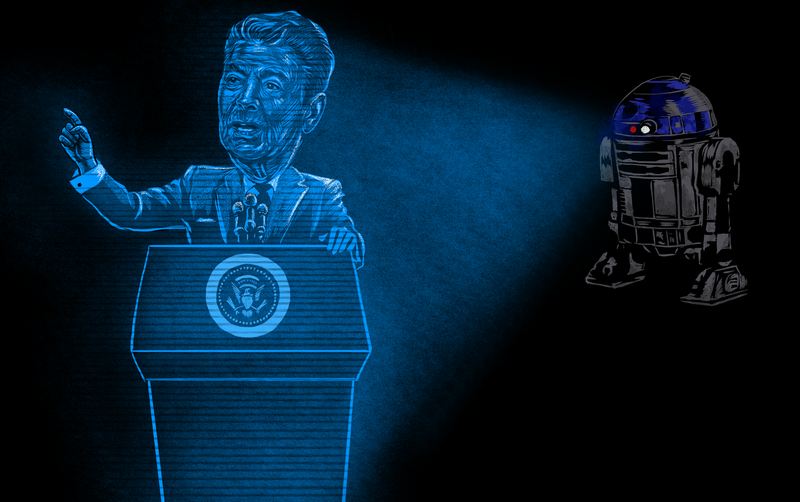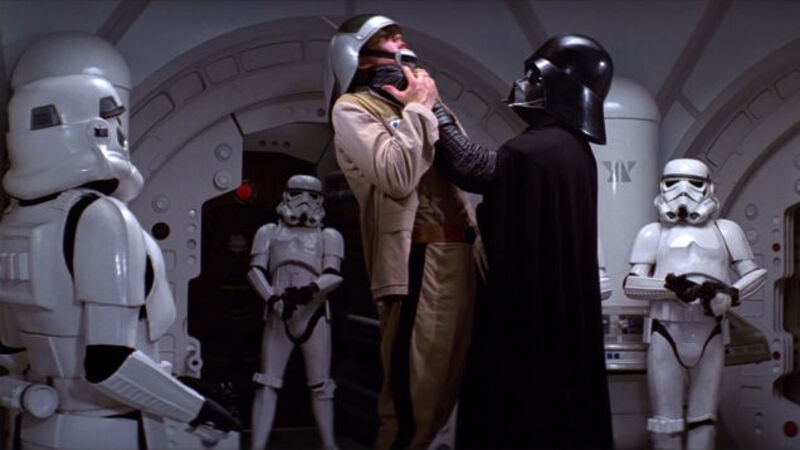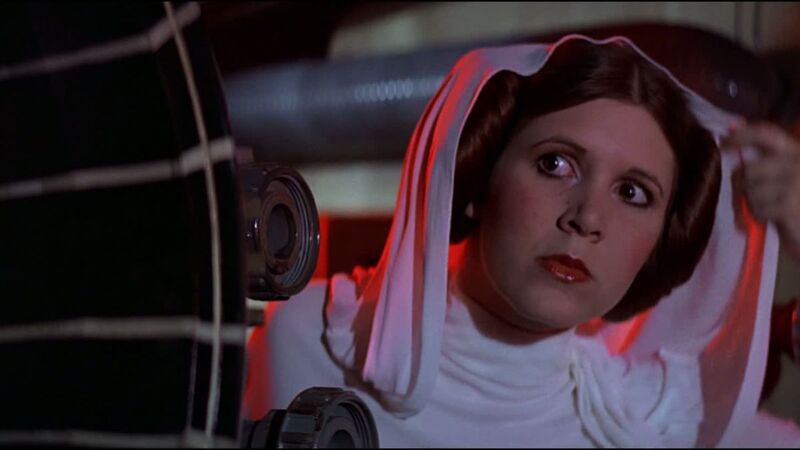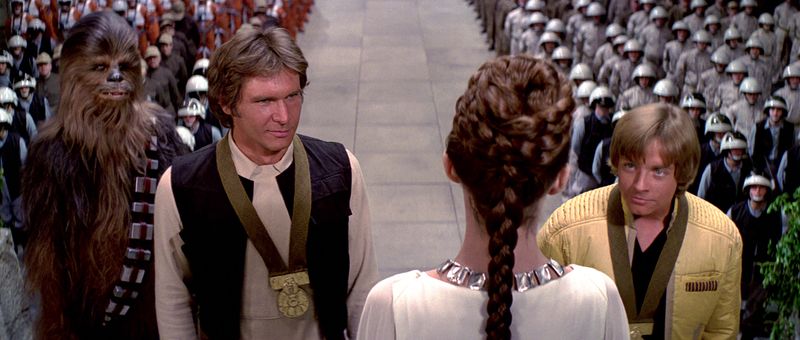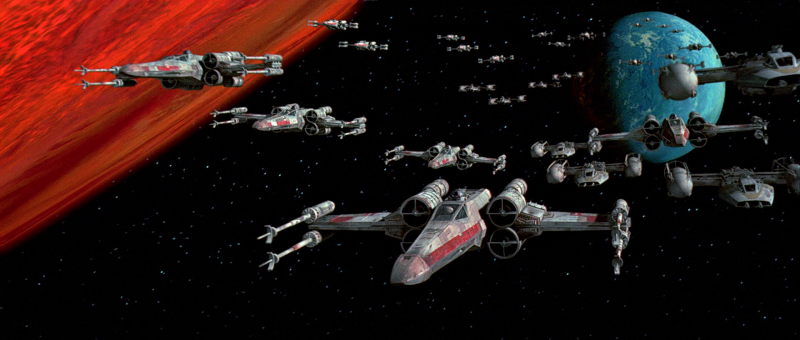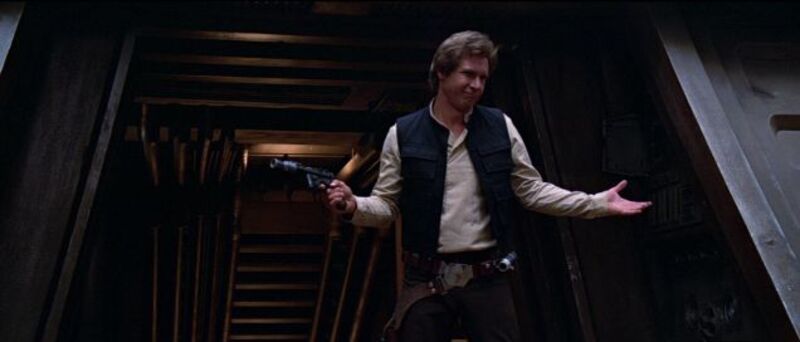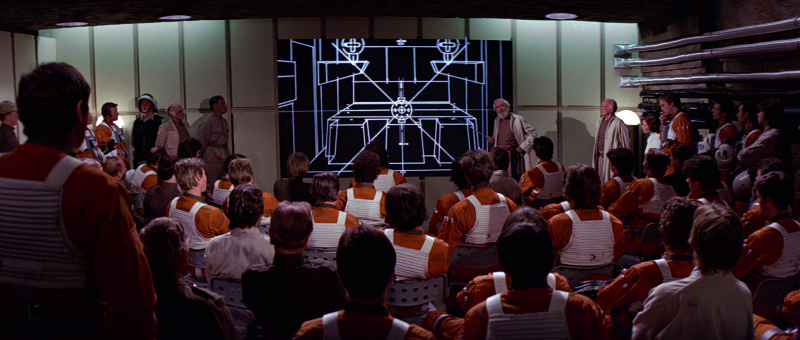![How Star Wars Helped Create President Reagan]()
1. Star Wars starts out in the Wild West, the rough-hewn old frontier, and then it races upwards, soaring and expanding its scope, until at last it becomes World War II. It’s the story of drifters and dreamers, who find their purpose out in the absolute dead middle of nowhere, and end up leading the Revolution against an Empire. You can’t even imagine a more quintessentially American story than the original Star Wars.
George Lucas’ space opera arrived at a time when America was paralysed by doubt. The word “malaise,” which in 2015 sounds like some neurotic hipster affectation, was a defining term for the American psyche. A sitting president had been forced to resign in a dirty, ugly scandal, and meanwhile the United States had been forced to withdraw from Vietnam after a horrible war in which the U.S. seemed morally compromised. “Stagflation” gripped America’s economy, and we seemed to be unable to accomplish anything as a nation.
And to many observers, it seemed as though Star Wars was a pure jolt of American optimism and moral simplicity, that came at just the right time to make us feel like ourselves again. As the Washington Post said in 1983, the original Star Wars “helped close some of the psychological wounds left by the war in Vietnam. Star Wars tapped into inspirational depths that transcend political allegiance. It reflected politically uncomplicated yearnings—to be in the right, to fight on the side of justice against tyranny.”
George Lucas actually set out to create a polemic against American excesses, in which the evil Empire was supposed to be the United States. But Lucas also wanted to copy all the movies he consumed when he was growing up, including Westerns, Flash Gordon serials and heroic World War II films. And in copying films that were essentially propaganda for American military greatness, Lucas managed to distill them all down to the purest expression of our national mythology—which, in turn, helped set the stage for Ronald Reagan’s “morning in America” presidency.
![How Star Wars Helped Create President Reagan]()
2. In 1975, George Lucas was at a crossroads. He was supposed to direct Apocalypse Now, a gritty reimagining of Joseph Conrad’s Heart of Darkness set in the Vietnam War. Lucas had been trying to get Apocalypse Now off the ground for years, while his producing partner Gary Kurtz had been scouting locations. And now, his friend and mentor Francis Ford Coppola finally had the clout to get Apocalypse Now made, thanks to The Godfather Part 2. But Lucas had also spent the past couple years writing draft after draft of a project called The Star Wars. So he was torn about which movie to do first—and then Coppola told him it was now or never for Apocalypse Now.
As Chris Taylor writes in the book How Star Wars Conquered the Universe:
To Lucas’ friends, this seemed like the smart move. Lucas was, after all, an independent movie guy. It was his turn to make a big statement, something dark and gritty: his Chinatown, his Taxi Driver.
But Lucas decided he couldn’t put Star Wars off, so he let Apocalypse Now go, and Coppola ended up directing it himself. The reason, writes Taylor, was because Lucas wanted to do something for the kids, after he saw how his previous movie, American Graffiti, helped teenagers to straighten themselves out.
http://www.amazon.com/How-Star-Wars-...
In a 1977 Rolling Stone interview, Lucas explains more: “I saw that kids today don’t have any fantasy life the way we had. They don’t have westerns, they don’t have pirate movies, they don’t have that stupid serial fantasy life that we used to believe in. It wasn’t that we really believed in it... but we loved it. There’s nothing but cop movies, and a few films like Planet of the Apes, Ray Harryhausen films, but there isn’t anything that you can really dig your teeth into. I realized a more destructive element in the culture would be a whole generation of kids growing up without that thing.”
![How Star Wars Helped Create President Reagan]()
Long before Lucas started talking about Joseph Campbell and the Hero With a Thousand Faces, that pseudo-ethnography about myths and fairy tales, he was acknowledging that Star Wars had a huge debt to the films he grew up with, says Kathleen Moran, the Associate Director in the American Studies Department at UC Berkeley.
In fact, Lucas claimed that Star Wars would address the same ideas as his version of Apocalypse Now, just relocated to another galaxy in the distant past. He wanted Star Wars to be a story about an inhuman oppressor being defeated by a native uprising—and in early drafts, the Emperor was based on Richard Nixon, Moran points out.
Star Wars was intended to be “a commentary on Vietnam,” Taylor tells io9. Lucas “was trying to portray the Empire as the U.S. military.” This is much clearer in Return of the Jedi, the third film, where the Viet Cong finally show up “in the shape of the Ewoks,” says Taylor. “That’s absolutely what they were intended to be: the tiny primitive force that brings down a mighty technological empire.”
![How Star Wars Helped Create President Reagan]()
Lucas didn’t fully succeed in conveying the political themes he wanted Star Wars to express all along, until he made the prequel films years later—and perhaps as a result, those were much less watchable.
But meanwhile, Lucas was lifting from Westerns, pirate movies, classic adventure serials, and World War II dramas like The Dam Busters and Tora! Tora! Tora! As the 1983 Washington Post article says, Lucas’ main contribution in the original Star Wars consists of “rejuvenating Hollywood’s moribund action genres,” including “the swashbuckler, the western, the combat melodrama [and] the science-fiction serial.”
So the story of Star Wars, in Lucas’ mind, was something subversive and hyper-political about the overreaching of American power. But he was also determined to bring back the optimistic, sunny films of his youth—and he was much more successful in copying the unabashedly pro-American, devil-may-care adventures he had loved as a child (even if he claimed he didn’t believe in them) than in sneaking in some kind of anti-authoritarian message. Nobody ever walked out of the original Star Wars saying “Man, fuck America.”
3. In fact, nobody ever goes to a movie and identifies with the villain, except maybe if they’re played by Alan Rickman or Sigourney Weaver. And Star Wars, in particular, does a masterful job of making you identify with Luke Skywalker and Princess Leia. Luke Skywalker hits the trifecta of American heroes: small-town farm boy, secretly marked for greatness, learns to go into a rough saloon and hold his own. Luke’s yearning to find himself and discover his destiny is the emotional hook of Star Wars, and it ties into many strands of our national mythology about explorers and adventurers and white saviors.
![How Star Wars Helped Create President Reagan]()
Every red-blooded American dreams of being on the wild frontier, fighting Tuscan Raiders and Jawas for mastery of the land and control over the wayward droids. Or being a heroic drifter like Han Solo, who gives no fucks but has a not-so-secret heart of gold. Or leading the American Revolution against the Redcoats, which is pretty much the role that Princess Leia fits into the most, when she’s not being a reluctant damsel in distress.
By the time you get to the end of the film and there are spaceship dogfights and bombing runs, it’s become fully World War II—which happens to be the last war that America fought where pretty much everybody agreed we were in the right, and we unambiguously won.
Star Wars, the first movie, isn’t just joyfully escapist and thrilling—it’s also triumphalist and full of the promise that war can be fulfilling and worthy. Even if you ignore the fact that it ends with Luke and Han getting medals at a crazy awards ceremony that Taylor, a die-hard Star Wars fan, describes as “fascist.”
![How Star Wars Helped Create President Reagan]()
Among the moribund genres that Star Wars rescues is the war movie—during the decade prior to the original Star Wars, there had been basically no military action films, despite the Pentagon’s constant willingness to provide expensive troops and machinery to Hollywood for free, says David Sirota, author of Back to Our Future: How The 1980s Explain The World We Live In Now. You have Green Berets in 1968 and Tora! Tora! Tora! in 1970, but that’s basically it. The Vietnam War era was known more for anti-military films than ones which depicted heroic, valiant soldiers.
http://www.amazon.com/Back-Our-Futur...
“Star Wars is clearly about war,” says Sirota, but “because it was set in space and has a science-fiction setting, it was able to tap into those narratives that people had been used to before the Vietnam War—but in a way that didn’t overtly invoke the non-fiction military themes” that people had been reluctant to go to theaters for, immediately after Vietnam.
Of course, there were plenty of actual movies about Vietnam, including Apocalpyse Now, in the decade that followed. But, says Sirota, “Star Wars was a way that Hollywood figured out to tell heroic military stories, but in a way that didn’t strike so close to home, so soon after an actual war.” Star Wars “showed American military heroics in a setting that was safe because it was officially fantasy.”
![How Star Wars Helped Create President Reagan]()
After this, the Pentagon spigot was turned back on, and Hollywood was able to take advantage of U.S. military assistance in making pro-military movies, like Top Gun.
The genius of Star Wars is not just that it brings war back as a subject for movies—but it allows you to fantasize about being the “good guy” in a winnable war. To some extent, this was a prospect that was foreclosed in real life by the inventions of weapons of mass destruction such as nuclear weapons, that render any victory too messy and costly. Star Wars includes one such weapon, the Death Star, which is the focal point for all of Lucas’ messages about a “technological terror” that he brought over from Apocalypse Now. But in one of the movie’s many moments of wish-fulfillment, the Death Star turns out to have a fatal weakness, and its destruction makes heroic ship-to-ship combat the defining mode of battle in the Star Wars galaxy once again.
4. Most of us science fiction and fantasy nerds speak of 1980s movies with a special reverence. The 80s were the first age of the blockbuster, in which summer belonged to larger-than-life heroes and incredible action. These films had a purity, and an innocence, that felt just as thrilling as their lavish VFX sequences.
![How Star Wars Helped Create President Reagan]()
When you watch a movie from the 80s today, the pacing feels slower and the effects feel more crude than more recent films. But movies from Ronald Reagan’s presidency still have a lot in common with today’s films, in their focus on thrills, action and spectacle. When you watch a movie from the 1970s, though, it’s very different.
The decade preceding Star Wars is dominated by slower, more meditative science fiction movies. A ton of these films are dystopias, or post-apocalyptic worlds (in the vein of The Road, not Mad Max.) Instead of Arnold Schwarzenegger kicking ass, there’s Charlton Heston gritting his teeth through an endless series of messed-up futures. There’s seldom a happy ending, or an easy fix.
And Star Wars, more than Spielberg’s Jaws or Close Encounters of the Third Kind, created a new template for giant blockbuster movies. In these 1980s films, says Sirota, there’s not a lot of nuance. Things tend to be “good versus evil,” “us and them,” and clear moral lines. “You’re either on one side or your on the other,” says Sirota. “This is not The Wire.”
![How Star Wars Helped Create President Reagan]()
“You have to wonder, without Star Wars reinventing the blockbuster—along with Jaws—would we have had a Rambo?” asks Taylor. “Would we have had all those confident, muscular movies of the 80s?”
“Look at Star Wars—the original movie—and think about it in the context of 1977,” Taylor adds. “It doesn’t look like 1977. It doesn’t look like Jimmy Carter, and ‘malaise,’ and the bad times that America was going through. It looks like the 1980s. It’s optimistic, it’s militaristic. It’s armed to the teeth and naïve as hell.”
The “tentpole” movie would have become a huge phenomenon even if George Lucas had directed Apocalypse Now instead of Star Wars. Advances in technology would have guaranteed more space action, bigger explosions, greater spectacle. But Star Wars found a way to translate the uncomplicated optimism of mid-twentieth-century films to a new idiom—and that helped movies of the 1980s to be much more upbeat, and morally simple.
5. Pop culture shapes politics, as much as the other way around. Our movies, TV shows, games and other media help create our matrix of ideas about how the world works. Our fictional heroes represent our internalized images of the kinds of people we’d want to be in real life. Fictional victories make us believe that we can triumph over real-life problems, however intractable.
![How Star Wars Helped Create President Reagan]()
Ronald Reagan was running for president just as the marketing campaign for the second Star Wars movie was reaching fever pitch. Star Wars represented not just high-tech space adventure, but nostalgia—the original trilogy isn’t just set in a time “long, long ago,” but feels like a product of an earlier, simpler era. Reagan’s “Morning in America” campaign dovetailed perfectly with the sense of nostalgic optimism that Star Wars stood for.
As that 1983 Washington Post article makes clear, Americans were tired of feeling bad about themselves, and sick of defeatism, and Star Wars was a gateway drug to a new triumphalism. We could blow this thing and go home. We could be the good guys, with easily identified bad guys.
Reagan’s policies were explicitly connected to Star Wars on two occasions: Once, when he described the Soviet Union as an “Evil Empire,” and once when his missile-defense program was dubbed “Star Wars.” Both of these were more or less accidents, says Taylor. Reagan’s speechwriter has said he didn’t intend “Evil Empire” to be a Star Wars reference, but that speech happened just as the original Star Wars was showing on HBO for the first time, and people made the connection.
![How Star Wars Helped Create President Reagan]()
And using “Star Wars” to describe Reagan’s SDI idea was actually the Democrats’ idea—something they soon came to regret, because “Star Wars” doesn’t sound silly and dismissive, but rather awesome.
When you look the Empire through the prism of the Cold War, it does start to look like “a caricature of the cartoon of the Soviet Union,” says Sirota. “It’s this highly bureaucratized, un-democratic, soullessly technological, imperial administration. It’s easy to see the Empire as a proxy for that.”
“In the late 1970s, heading into the 1980s, that story of the Rebels against the Empire took on some political overtones,” says Sirota. “The idea of rebelling against this kind of faceless government was a theme in the movie, and depending on your political perspective,” says Sirota, you could view that as the Reagan revolution against Big Government. “I certainly think it tapped into the zeitgeist of that era.”
And Reagan, a former actor, was also keenly aware that this was a new era, in which movies were more immersive and spectacular than before. As Moran points out, Reagan famously said, “It is the motion picture that shows us not only how we look and sound, but more important, how we feel.” In Reagan’s America, we not only identified with Luke Skywalker and his friends, but also saw them as the best representations of who we really were inside.
And the purity of their struggle against evil was the greatest gift that Star Wars gave Ronald Reagan.
Top image: Artwork by Jim Cooke.
Charlie Jane Anders is the author of All The Birds in the Sky, coming in January from Tor Books. Follow her on Twitter, and email her.




